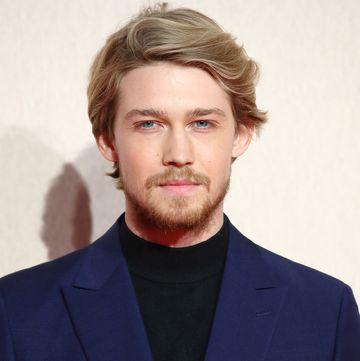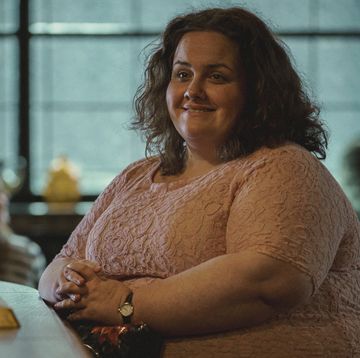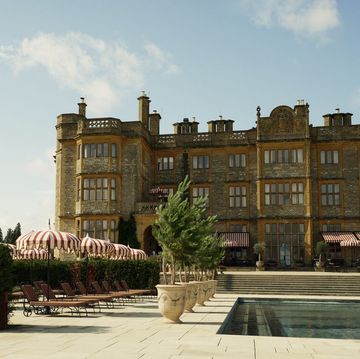In the run up to this year's general election, is there a woman that stands out as the most powerful in Britain? Could you even come up with a top five? We look back at our May 2014 piece where Amelia Gentleman profiled the women we think are the most prominent and powerful in Britain – and asks why the answer isn’t easy to find
Could you name the most powerful woman in Britain? Go on. Someone alive (not Margaret Thatcher), British, who hasn’t inherited their power (the Queen’s out), and whose influence is heralded widely by her peers and beyond. I’d be willing to wager that you can’t. It’s shockingly difficult.
When I was first tasked with writing this feature, I thought, ‘What a brilliant subject! I’ll have no problem coming up with names.’ But then I realised I couldn’t answer the question. So I’ve been asking everyone I interview for their answer. Most responses are prefixed with an awkward pause, followed by a few doubtful suggestions.
It’s not that there aren’t candidates: Home Secretary Theresa May or Baroness Cathy Ashton, the EU foreign affairs representative, or Harry Potter author J. K. Rowling, the world’s first female billionaire novelist (who, hearteningly, lost her billionaire status after giving so much away to charity). We have no shortage of brilliant women who have achieved extraordinary success. Look at Baroness Hale of Richmond – the most senior female judge in British history. Take Victoria Beckham, Phoebe Philo, Stella McCartney and Vivienne Westwood in fashion, or Lily Allen and Adele in music. Look at Caitlin Moran, who has brought feminism to a new generation. But would these women rank among the top 10 most powerfully influential people in Britain if it was a mixed-gender list?
Last years’ Forbes world female power list featured only two Brits out of 100 – the Queen at 40, and J. K. Rowling at 93 – compared to 58 Americans. Scanning the names, headed by Germany’s Angela Merkel, is mood-lifting – there’s also Sheryl Sandberg, Facebook’s COO, (and author of Lean In, a study of why women often don’t make it to the top), plus Hillary Clinton – but it does make you wonder why Britain produced so few candidates.
When Radio 4’s Woman’s Hour made a similar, all-British list, three of their top five achieved power, at least to some extent, by inheriting it from their fathers. The Queen was number one, at number three was Ana Botin, CEO of Santander (unquestionably an exceptional business figure, but the bank is the family business). Similarly, Elizabeth Murdoch (number five), while impressive in her own right, owes much to her father, Rupert.
It is sad, but predictable, that at a time of optimism about a new wave of British feminism, we should still find it hard to point to so few women occupying the country’s most senior positions. Yet here’s the irony: glance at newspapers and the most popular news websites (with hundreds of millions of users) and you’ll see women everywhere, forced into the public consciousness – but almost never for their achievements, rather for their bodies (thinner, ‘curvier’, pregnant), love lives or looks.
A recent study analysing which women most frequently feature on the front pages found that Kate and Pippa Middleton topped the list. While I have nothing against them, it’s certainly not their careers and influence that landed them there.
So who is to blame for this absence of visible powerful women? ‘We live in a world designed by men for men,’ Minister for Women and Equalities, Maria Miller, tells me. ‘There are many women in the UK today at the top of their game, but people struggle to name them. Partially, this is because they’re still so outnumbered; we automatically associate men with power and influence. But times are changing, and not enough is done to highlight the huge contribution women make across all areas of life. We have more women in work than ever before and we have inspiring female role models, but we need to help fill women with the confidence that matches their potential, so we get to hear about them.’
The number of women in UK politics bears this out, making up just 22% of all MPs. Of 22 cabinet ministers, just four are women (David Cameron promised it would be one-third female by the end of this government, but has so far failed to get even close). Britain is falling far down the global league table that assesses the representation of women in politics – in 2001, Britain was ranked 33 out of 190 countries; as of January 2014, we’d fallen to 64th.
Nan Sloane, director of the Centre for Women & Democracy, says beyond politics, things are even worse. ‘Most of us can’t name a woman who runs a major financial institution or company here – there are, for instance, no women on the Bank of England Monetary Policy Committee. The exceptions to this are women who have appeared on reality TV – but even then, Karren Brady is more likely to be described as Alan Sugar’s Apprentice sidekick than as a high-achieving, influential woman in her own right.’
Why does she think this might be? ‘We’re trying to overturn 5,000 years of behaviour in a couple of generations,’ she says. But Sloane has another interesting take, too: ‘The voice of power is male – it has a certain depth and it is able to produce a different sound to that of the female voice – imagine, for instance, a Prime Minister’s Questions at which most of the MPs were women: the sound would not be what we expect power to sound like.’
Sounds. Pictures. Is power that superficial? Certainly women who have a voice and speak their minds in this country often find themselves battling a nasty backlash.
The new and unpleasant phenomenon of online hate-speak against high-profile female figures doesn’t exactly encourage women to put their heads above the parapet. Caroline Criado-Perez, who successfully campaigned to get a woman’s face on a bank note, received Twitter abuse; Labour MP Stella Creasy got rape threats; when academic Mary Beard appeared on Question Time, one of the milder online commentators wrote she was ‘a vile, spiteful excuse for a woman’. Beard concluded: ‘It doesn’t much matter what line you take as a woman – if you venture into traditional male territory, the abuse comes anyway.’ Bear in mind, Mary presents nothing more controversial than BBC programmes about classical history. It’s astonishing that, compared to the chauvinist camaraderie of, say, Top Gear (incidentally, the world’s most-viewed factual programme, making Jeremy Clarkson and his cohorts a powerful, and all-male, TV force), it’s Beard who comes repeatedly under fire.
The picture isn’t brilliant in politics and television – but it’s not that great in industries where we have lots of talented women, either. Although we have acclaimed designers, there are only a few women who have made millions from fashion, like Net-a-Porter’s Natalie Massenet and Angela Ahrendts, formerly Burberry’s CEO and now Apple’s Retail Chief. On the whole, the people in charge of the money remain men. And the UK music industry still feels like it is ruled by male svengalis. Somehow, we don’t have British female icons in the vein of Beyoncé and Madonna, who have catapulted beyond album sales to secure positions of enduring cultural influence.
Is Maria Miller right that it’s just a question of filling UK women with confidence? I have to confess to feeling a bit annoyed by this reponse. To suggest the reason why we don’t have more powerful women in this country is tied up with an innate timidity that needs to be tackled, is almost saying that it is our fault for failing to overcome those pesky internal barriers. Besides, it ignores the massive elephant in the room: pregnancy and children.
Some women choose not to return to work after they’ve started a family, or find it hard to get re-employed, particularly if they’ve taken a long break. The women who do return to work after taking time out to have children notice that their male colleagues have moved ahead. It is at this point when the gender pay gap (which last year began to widen across the board for the first time since 2008, and sees men earning, on average, 15% more than women) really begins to be felt. At a time when men are taking on more powerful roles, women often drop out of work or scale back on responsibilities. It’s not surprising that they don’t feature on power lists, if they’re under pressure to provide a perfect childhood for their offspring. Even in families who share responsibilities, it’s still often not 50-50. Don’t believe it? Ask which parent is responsible for (or even knows about) their child’s immunisations.
But there’s no harm in making an effort to boost women’s confidence, and in reminding women that there’s nothing embarrassing about wanting to succeed. It is very un-British to admit to being an ambitious female when motivated women here still risk being branded as crazed, power-hungry Lady Macbeth figures. (It’s hard to imagine a man suffering the same fate.)
It’s possible that women just don’t like the sound of their own voices as much as men do, and are more reluctant to promote themselves. But I suspect it isn’t so much an issue of shrinking violets, of women retreating from the limelight, but more simply that they haven’t been asked. Only very recently have TV news shows begun to avoid male-only panels – Danny Cohen, the BBC’s director of TV, said in February: ‘We’re not going to have [any more] panel shows with no women on them. You can’t do that. It’s not acceptable.’
Then there’s the weirdness around how you look. It’s very well being confident and ambitious, but it’s usually still the case that only the most photogenic women see their profiles soar – the more ordinary don’t always enjoy this boost. This just isn’t the case for men.
There are those who are more upbeat, like Shami Chakrabarti, director of human rights campaign group Liberty, who offers her own mini-shortlist. As well as Baroness Hale of Richmond (the first, but still the only, woman in the Supreme Court), she proposes Frances O’Grady, the first female General Secretary of the British Trades Union Congress, and Sara Thornton, Thames Valley Chief Constable and Britain’s most senior female police officer. Once you think about it, names do start raining down – Jude Kelly, Artistic Director at the South Bank Centre, or Natalie Bennett, leader of the Green Party. And Editor of the London Evening Standard, Sarah Sands; Cameron’s Deputy Chief of Staff, Kate Fall; and possible future Labour leader, Yvette Cooper.
Still, even if it serves as a bleak reminder of how far we have to go before this is an easy question to answer, it is key that we ask it. And even more key that we use our indignation to make a request for a pay rise and a promotion, to find our confidence, and to – quite simply – achieve. Businesswoman Baroness Martha Lane-Fox, another female power list regular, refuses to be downcast. ‘There is so much more that needs to be done – but I can’t remember a time when there has been more debate about gender equality.’
I only hope that the next time I’m asked to answer who Britain’s most powerful woman is, I won’t need to use 2,000 words – just two.












